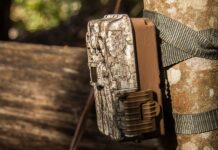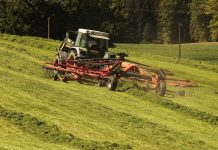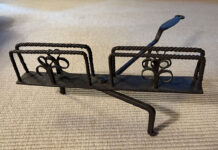The other day my friend, Ed Brenner, asked if I knew anything about a Nixon Co. from Alliance, Ohio. I confessed that I didn’t and Ed told me that he’d recently viewed a large collection of cast iron implement seats, among which was one with “Nixon & Co.” and “Alliance, Ohio,” cast into it.
Not tractor seats
Cast implement seats from the late 1800s and early 1900s often had the machine manufacturer’s name and city cast into them. Uninformed folks insist upon calling these cast iron seats “tractor seats,” which drives seat collectors crazy because they were made before tractors were even heard of by most farmers.
Just about every horse-drawn implement made in those days had a seat for the operator, and most were made of cast iron.
Early in the 20th century, machinery manufacturers began to use stamped steel seats, which were cheaper and lighter in weight. A visit to the Alliance Library revealed that not only did Canton, Massillon and Salem have farm implement manufacturers, but so did Alliance.
Early years
Born in 1825, in Washington County in southeastern Pennsylvania, William A. Nixon started out as a farmer, but turned up in Alliance in 1849, where he partnered in the “produce and commission business” with a man named John Pettit.
Almost a decade later Nixon “became connected with the Agricultural Works.” A recession had commenced in 1856, resulting in the “Panic of 1857.” Businesses failed and banks closed, not only in this country, but in the rest of the world.
In January of 1858, when prospects for the future seemed grim, a group of men arrived in Alliance with a proposal to establish a factory to manufacture agricultural implements. Although it is not recorded who these men were, or where they came from, they had chosen Alliance due to its railroad network, with both east, west, north and south lines intersecting in the village.
Alliance welcomed the new venture and within “…the next day or two a machine shop, very limited in capacity and in most sorry repair, was taken possession of, machinery erected, and with a few hands this company commenced operations.”
This, apparently, was the original “Agricultural Works.”
Nixon hired
William Nixon was either hired or bought into the firm. An 1868 Alliance Business Directory tells us that, “No better man (than Mr. Nixon) could have been found for the place, and from the time he took charge of its affairs, the prosperity and business of the establishment began to loom up, and to-day its affairs are in a permanent and prosperous condition.”
The firm soon became Nixon & Co., and manufactured a double shovel cultivating plow that was known as the “Alliance Shovel Plow.” Most shovel plows were constructed primarily of wood, but the Alliance plow, patented by Charles O’Bryan and Henry Kreps of Minerva in 1861, had a wrought iron beam and handles.
One account says that Nixon turned out $30,000 worth of the plows in 1868. The Oct. 21, 1871, edition of the Alliance Weekly Local reported the Alliance shovel plow won first place at the Ohio State Fair.
New mower
In 1854, Cyrenus Wheeler of Cayuga County, N.Y., had patented a mower for cutting grain and grass. The machine was improved several times and became quite popular as the “Cayuga Chief.”
The mower was first built by various New York shops. But in 1866 the Cayuga Chief Manufacturing Co. was organized to build the machine as well, with Mr. Wheeler as president.
In 1874, the concern was consolidated with D. M. Osborne & Co., of Auburn, N.Y.
Wheeler seems to have licensed the use of his mower patent to Nixon & Co., because in 1868 the Alliance firm was making the Cayuga Chief, “…one of the finest Mowers and Reapers now in use.” The 1868 account adds, “No better machine ever entered the meadow or field of any farmer, than the Cayuga Chief.”
Steam engines
Nixon made steam engines, as well, using an engine to “… (furnish) power for all their works on less than one ton of slack coal per day”, and that, “They manufacture these engines to order, and those sold, give most perfect satisfaction in all respects.”
They made mill and mining machinery, including steam pumps. A Nixon pump, “…has been successfully working the past three months, throwing 500 barrels per hour.” Nixon pumps were said to be used on the “Western Division of the Union and Pacific Railroad,” as well as in mines.
Over extended problem
Despite the rosy outlook in 1868, trouble loomed for William Nixon. Since the Civil War ended, railroad building had caused the economy to boom, most of it financed by the huge investment firm of Jay Cooke & Co.
By 1873, Cooke realized they were seriously over extended and declared bankruptcy. This and several other factors set off the Panic of 1873.
The New York Stock Exchange closed for more than a week, banks failed and credit became non-existent. Many major railroads failed, as did thousands of factories. This cost hundreds of thousands of jobs.
One of the factories that succumbed to the hard times was Nixon & Co., although the Alliance Weekly Local reported in Nov., 1872, that a new firm called the Stark Mfg. Co. was operating the Nixon Works, so the effects of the panic may have begun earlier than 1873.
An 1876 directory reveals that William A. Nixon was still located in the Alliance Agricultural Building, but now he was, “Agent for the celebrated Mitchell wagon.”
The “patent iron double shovel plow” was still being built there, although the manufacturer was listed as L.G. Nixon, whose relationship, if any, to William is unknown.
Nixon’s steam business seems to have been taken over by the Alliance Steam Boiler Works, “Murphy & Davis, props.,” with office and works at “Nixon & Co’s. Agricultural Building.”
There are still many questions that remain in regards to Nixon & Co. Additional information or feedback is welcomed.











